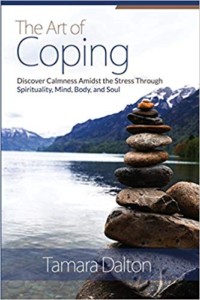Title: The Art of Coping
Author: Tamara Dalton
Publisher: Self-Published
ISBN: 978-1093422290
Pages: 330
Genre: Self-Help
Reviewed By: Dan MacIntosh
Pacific Book Review
Much has been written about establishing coping mechanisms. Bookstore aisles are filled with volumes of advice on the topic. Many of these works are written by authors that seemingly have it all together. It’s tempting to look upon these writers and comment, ‘Well, that’s easy for you to say. You already have it good.’ However, Tamara Dalton’s book, and unique perspective, is strikingly different. She may have (most of it) all together, but life hasn’t always been this way. She emigrated from Haiti and admits to marrying the wrong man just to obtain the proper immigration papers. For a period, she was left feeling like a failure after two disastrous marriages. You cannot fully test your coping methods, unless you’ve first needed to apply such methods to your own life. Dalton has been tested and come out the other side better for it.
Dalton’s second book is about discovering “calmness amidst the stress through spirituality, mind, body and soul.” She’s included a disclaimer at the book’s beginning, stating how this work is not intended as a substitute for professional mental health care. Instead, it’s aimed at most of us, the relatively mentally healthy people of the world that sometimes find it difficult to address the stresses in our lives. In addition to her experience from a life of hard knocks, Dalton is also a registered nurse, an ordained minister and a certified life coach. Yes, she knows what it feels like to sometimes be overwhelmed by the circumstances of life; however, she also has training and experience in addressing these stresses, from a professional perspective.
The minister in Dalton comes through whenever she includes Bible verses in her book. There are instances where nothing makes her point better than a scripture verse. For example, in her 4th chapter, titled Thinking Positively – The Art of Combating Your Stress, she quotes Jeremiah 29:11, which states: “For I know the plans I have for you, declares the LORD, plans for welfare and not for evil, to give you a future and a hope.”
Being that Dalton writes so often from personal experience, much of what she says is extremely practical. In chapter 6, concerning The Magic Words – Handling Stress Through a Grateful Spirit, she doesn’t just tell readers to become more grateful; she also lays out some simple tasks that help to make a person more grateful. Two very concrete ways to behave more gratefully can include writing a grateful journal. In the same way writing down new information helps us learn new things, so too does journaling help us focus more on the experiences for which we’re most thankful. “Store all the happy memories in this journal,” Dalton suggests. “Don’t let an inkling of grievance tamper its goodness. You can write about almost anything that made you smile that day. Enter those funny things your child or student asked that day.” If the discipline of keeping a journal sounds too taxing, Dalton also writes about instituting a grateful jar. Throughout the year, put little notes about what you’re thankful for, and then on the first of the New Year, take them out and read these. One reason we’re not grateful, and thus overstressed, is that we quickly forget all the good things that happen in our lives throughout a year but can’t forget all the bad stuff. We ought to make a concerted effort to keep all the positive memories at the forefront of our minds.
Little of what Dalton writes about is new information. You may find yourself thinking, ‘Well, I already knew that,’ while reading her book. Our problem, though, is not the ‘knowing,’ but the ‘doing,’ with its many practical suggestions, The Art of Coping is a handy handbook. Even if you only apply a few of Dalton’s suggestions, reading this book will be well worth your time.


